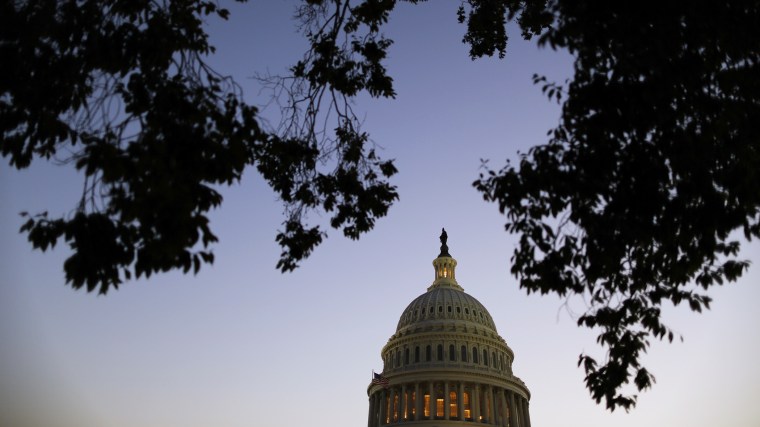The Republican-led Congress has just 12 days before the nation's debt ceiling has to be raised. If lawmakers fail to meet their responsibilities, the country won't be able to pay its bills, we'll default on our debts, the full faith and credit of the United States will be in jeopardy, and the economic consequences will be severe.
At this point, congressional Republicans appear to be divided into two groups. The first, which includes the GOP leadership, knows it must raise the debt ceiling, but this faction has no idea how to complete the simple task. The second, which includes far-right members in both chambers, wants to hold the debt ceiling hostage, threatening to crash the economy on purpose unless Democrats meets their demands, but this faction hasn't bothered to fill out the ransom note.
So far, markets aren't panicking, because everyone is working from the assumption that Republicans won't deliberately create a recession for no reason -- though anything's possible.
What's striking, though, is how little work is getting done. We're 12 days away from a dangerous deadline -- Congress is only in session for 7 of those 12 days -- and Congress isn't even trying to move towards a resolution yet. Instead, the GOP-led House spent time yesterday on something called the "
Default Prevention Act."
With the potential for an unprecedented federal default two weeks away, House Republicans on Wednesday plan to pass legislation not to avert disaster, but rather to manage it, channeling daily tax collections to the nation’s creditors and Social Security recipients if the government’s borrowing limit is not lifted.
Let's put this in everyday terms. Imagine a gang told you they plan to burn down your town unless their demands are met. You're skeptical and tell the gang to go away. But the gang members stick around and say, "Before we burn down your town, let's start making plans to prioritize which parts of the town you might want to rescue before we turn violent."
That, in a nutshell, is what the "Default Prevention Act" is all about -- the gang members
passed a bill yesterday to prioritize which bills they'll allow the United States to pay, and which bills will get burned by their fire.
The problem, of course, is that all of this is completely insane.
What we're talking about is a plan in which Republicans try to manage the fire from their own arson, "channeling daily tax collections to the nation’s creditors and Social Security recipients" after they refuse, on purpose, to raise the debt ceiling.
And why would GOP lawmakers prioritize the nation’s creditors and Social Security recipients? On the former, because so much of the global economy rests on U.S. Treasury bonds, a deliberate default risks crashing financial systems across the planet. That would be ... catastrophically bad.
On the latter, congressional Republicans don't want to be responsible for cutting off Social Security checks for millions of American seniors, right in time for the holidays.
The "Default Prevention Act" is, by this measure, misnamed. It would prevent the nation from defaulting on some debts, while encouraging the nation to default on others.
Making matters just a little worse,
Slate's Jordan Weissmann
explained that the GOP plan appears to be illegal and literally impossible to implement.
[E]ven if the government could borrow to pay bondholders and seniors, crossing the debt limit would still be plenty apocalyptic. Treasury's computers still might not be capable of prioritizing its obligations, in which case we'd still end up failing to pay some bondholders despite Congress's intentions. The mere threat of such an accidental default could cause markets to seize. If the Treasury did successfully keep money flowing to its lenders, meanwhile, the government still wouldn't be able to cover all of its other costs, and thus would be forced to implement massive, immediate spending cuts to other programs, likely dragging the U.S. and probably the rest of the world into a recession.
He's referring, of course, to a recession that could easily be avoided by simply raising the debt ceiling -- a simple, procedural vote that costs nothing.
Tick, tock.
